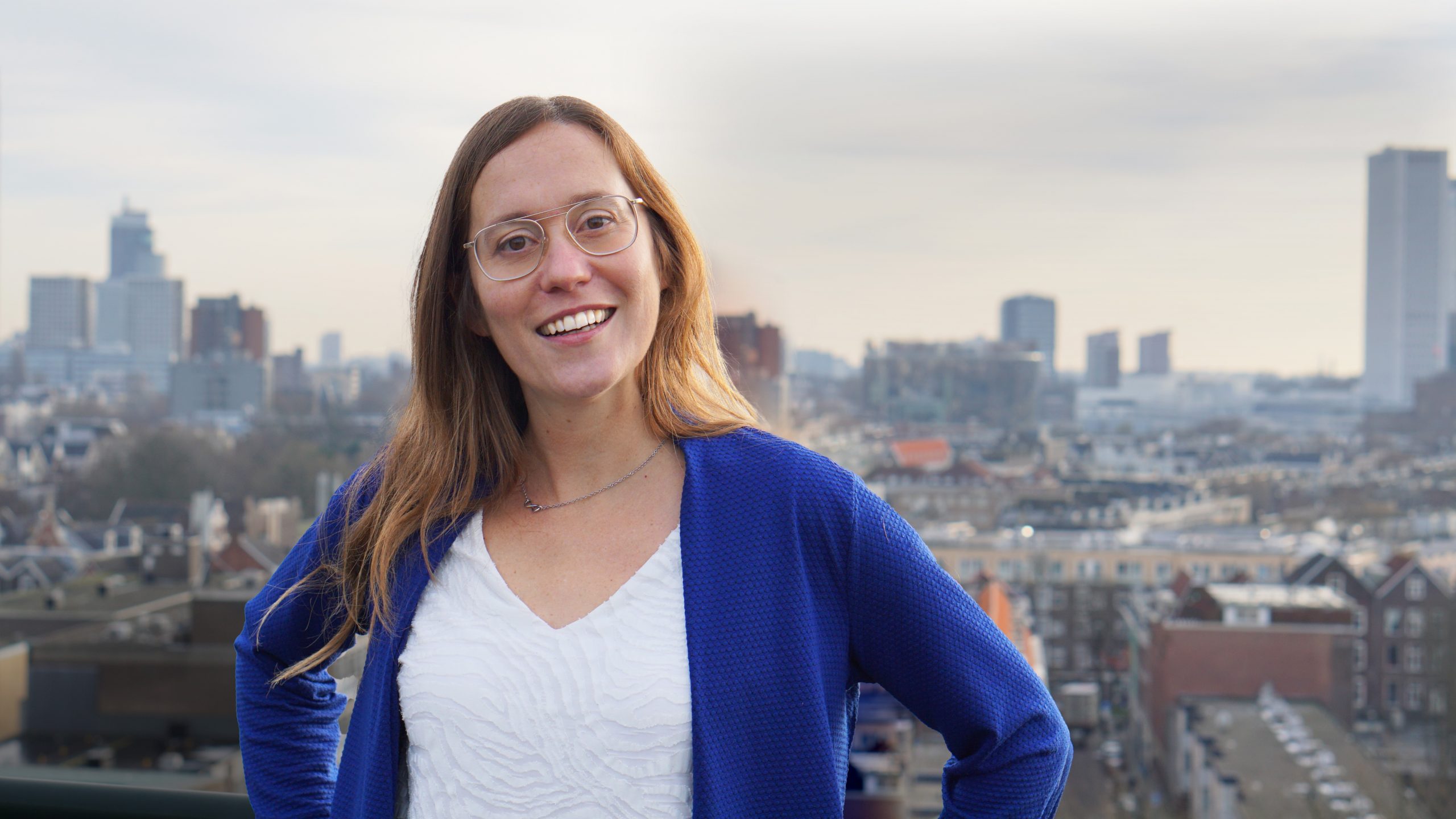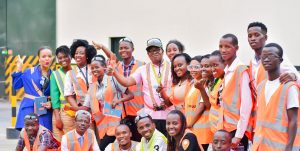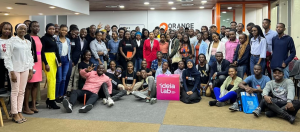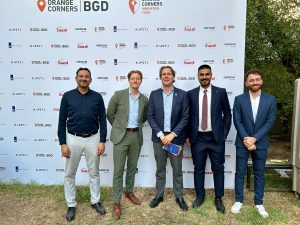The journey of an entrepreneur is often described as an intentional (and often romanticised) path that a brave individual takes to overcome obstacles and reach success. We imagine a Steve Jobs tinkering at a first Mac computer in a garage in California, or Tony Elumelu building his business empire. But what is the road to success really like, and how linear is this journey actually?
To address this question, we interviewed a successful entrepreneur: Petra Beris, one of the founders of TransitionHero and Engineers Without Borders.
Can you tell us how your journey as an entrepreneur began?
I studied chemical engineering in Eindhoven, in the south of the Netherlands. My motivation to go there was to invent a cure for cancer. But when I found out so many people are doing that I decide to focus on product development. After graduation my idea was to build great things globally and I found a job in the off-shore industry with a company that builds big oil pipelines at sea. I worked there for over 5 years on various innovative projects from design to training of operators. I also did a lot of troubleshooting and project management. While working there I learned a lot, and developed a global mindset. But I also came to the conclusion that I didn’t want to work in the oil and gas industry. It simply isn’t good for the world.
When I thought about my next steps, I realised that we needed more sustainable factories and that my recently developed can-do attitude of the offshore sector might be useful in helping to grow this sector in the Netherlands. So I started working for the engineering firm Tebodin as a project manager. However, I realised that most starting points for those projects were already developed and tightly engrained so the opportunity for actual change and actual sustainable impact is very small. Many chemical processes are still based on fossil oil, which isn’t intrinsically sustainable. For those processes only small changes in the margins were possible. We need to radically change those processes to be biobased and circular, which needs development of new technologies to do so.
How did you start TransitionHero?
When I realised that, I thought: “What then can be a solution?” I went on to study sustainable business at Cambridge University and thought a lot about my ambitions. One day, I stumbled upon my new idea: There are a lot of small companies out there that have really interesting ideas with green technologies, at a lab or pilot level. They often have processes that are bio-based instead of oil-based, and this is where real change is. They simply need to grow much bigger and faster… and I was going to help them do just that!
Meanwhile at Tebodin, some changes within the company led me to doubt my future there. One day, a colleague from the business and innovation team at Tebodin, Stef, confessed to me that he wanted to be an entrepreneur before his 40th. For a while now, people had also told me that I should consider entrepreneurship and an angel investor who believed in us said: “If you start something I will invest in you”. So, we got together, had some wine and cheese, worked on our business plan for a year.
We worked on it very intensely. We did a lot of interviews with potential customers to validate our assumptions. Stef and I are very different people and are very complementary, so we also discussed the roles we would both take. We then pitched all our findings to the investors and they loved our ideas and invested in us. And then we just took off. We knew what we wanted to do, had the backing to do it and took the plunge. We went on to choose our name, TransitionHero, built a website and designed a logo, and before we knew it we had two customers. After that, we simply started growing. We now have a team of 18 people, a diverse combination of people with all kinds of skills and backgrounds, over 25 great clients in 7 countries and a turnover of 2 million euros.”
What’s your approach at TransitionHero?
Our big insight was simple: big engineering companies think very linearly, and that’s not the way to support a new green technology. They start thinking on the engineering side of the equation: what it’s going to look like, how will it function, and then at the end the costs of the whole factory come out of it. In the case of new green technologies, the whole factory can then become too expensive to make the business financially sustainable. We, on the other hand, start at the business case side with these new technologies. We make a financial model to make sure the new technology is financially sustainable and then we start designing the processes and the factory based on that. The business case is always leading.
In what countries are you operating?
We have most projects in the Netherlands but are all over the world with projects in Nigeria, the UK, Madagascar, Norway and perhaps in Germany soon. One of the projects I’m very proud of, is a project in Groningen where we’re helping a company called BioBT. They’re making benzene, toluene and xylene, which are the building blocks of the chemical industry. With the process of making these ‘building blocks’ from waste plastics, BioBTX is making circular chemistry possible. The University of Groningen also took part in this collaboration, and when this company wanted to take the next step and grow beyond their test phase, we started working with them and are going to build a larger demonstration plant.
Our initial ambition was to grow as big as possible in order to make most impact, but now we have landed on the idea to stay midsized in order to keep our dynamic and entrepreneurial culture. One of the other things in which we’re different, is that we aim to establish new companies as spin-off companies. We identify high impact new technologies, like capturing nitrous oxide or CO2 and then we search whether there are companies out there that we can support or whether we should build a new company around a certain technology. I realise I never thought I wanted to be an entrepreneur and now I approach everything as a startup with a business case and we’re even launching new companies as spin-off.
We see a very diverse team on your website, how did you find your staff, and how do you manage your team?
Beside my love and passion for the technical side by making things work through engineering, I get excited from the people and organisation around it: the strategic side, making teams work. We find our team members everywhere. There are so many people that think what we do is very interesting, so we always have a good supply of motivated talent. However, it remains difficult to find the right people that have the right technical knowledge that really help our customers further, have the right open mindset and take ownershi
In search of synergies within the team, we did a test with ‘123 values’ and then you choose ten work-related values that you most relate to. We see that ‘teamwork’, and ‘connection with others’ are values that everyone shares, furthermore ‘sustainability’, ‘authenticity’ and ‘honesty’ is also something they all share. ‘Being adventurous’ is also something a lot of them possess. So, it turned out that we select on these values even though we didn’t know that consciously. We also look at diversity in our team. I think we have a good multicultural and gender-balanced team with people from lots of countries and cultures, lots of women and a queer person. But we, more than anything, look at the type of person rather than the gender, and what this person brings to the team.
I’m a leader who gives people a lot of room for trial and error. If it doesn’t work, then I can offer support. I always make sure people can grow, by bringing them just a bit outside their comfort zone and let them do things that they’re not sure if they can do it. But not too much to not overstress them. In this way I see people really grow in the team and get more confidence about their skills. Before I was founder and director of TransitionHero, I already had a lot of experience with setting up an organisation, when I established Engineers Without Borders. That helped me to have confidence that I could do it again.
Can you tell us what it is like to work in a male-dominated sector?
90% of engineers are men, so it really is a man’s world. People underestimate you a lot as a woman. For me, now that I am more senior and have a more senior mindset, it has fortunately improved. But I have had instances where people thought I was the secretary when I really was the project manager.
In the beginning, I must admit, I tried to be too much like a man. Now, I realise I don’t have to, because my female strengths add a lot of value to the company. This is also how I coach new women in our team now. I tell them to change their mindset and trust their own skill set and background to make sure they grow in confidence. Because they bring so much knowledge and expertise to the project.
What advice can you give to the Orange Corners entrepreneurs?
I have found someone who coaches me as well. A year ago there was a period I found particularly tough, because we were dealing with a lot of growth for the company and I also wondered what my new role should be in that. Then I started seeing a coach who’s supporting me, challenging me and makes me look at challenges from different perspectives. That really helps
I think looking back, I don’t necessarily want to be an entrepreneur. But I want to make impact. What my company is doing is much needed and being an entrepreneur seems the only way to do this. If you find a purpose for your company as such and you believe in it, it will be a good business. My big advice for all Orange Corners entrepreneurs out there: keep your big goal in mind and stay focused on that, and then plan your smaller steps accordingly. And of course take your team along and inspire them so they also work towards the big goal.





